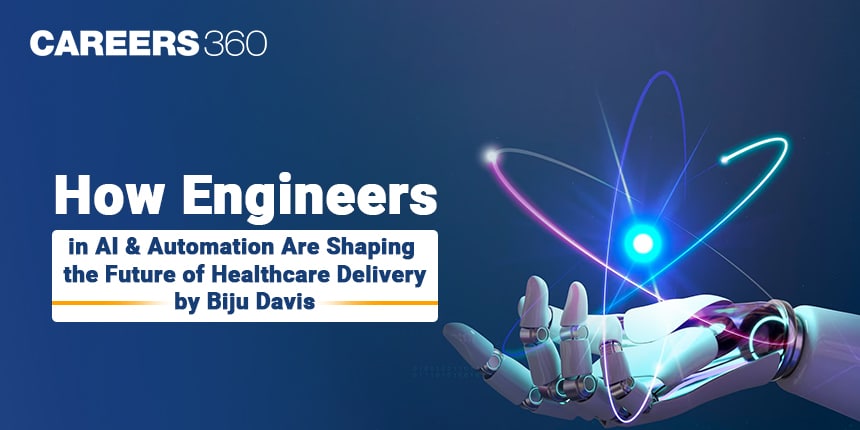UPES B.Tech Admissions 2026
Last Date to Apply: 28th Feb | Ranked #43 among Engineering colleges in India by NIRF | Highest Package 1.3 CR , 100% Placements
The fast-moving wave of automation and artificial intelligence (AI) is revolutionising every industry globally, including healthcare. AI and automation, through their productive harnessing, are making healthcare systems more effective, precise, and personalised for patients and healthcare providers alike as mentioned by Biju Davis, SVP of Engineering at Model N.

Revolutionizing Diagnostics with AI
Perhaps the most significant impact engineers can have on AI is through diagnostics. While traditional diagnostics may be great, they are time-consuming and highly prone to human error. AI can analyze vast datasets quickly, identifying patterns and insights that would take human researchers much longer to uncover. Machine learning algorithms can analyze huge medical image data sets of X-rays, MRIs, and CT scans at virtually unimaginable speeds, and also with high accuracy.
The primary players in the creation of these tools are engineers. They allow scientists to see patterns in data that may be overlooked. For example, AI has been demonstrated to be very effective in the identification of early signs of diseases such as cancer, heart conditions, and neurological disorders – sometimes before symptoms appear in patients. Early detection often means more effective and timely interventions, significantly improving patient outcomes.
Last Date to Apply: 28th Feb | Ranked #43 among Engineering colleges in India by NIRF | Highest Package 1.3 CR , 100% Placements
NAAC A++ Grade | Recognized as Category-1 Deemed to be University by UGC | 41,000 + Alumni Imprints Globally
Use of Automation to Enhance Hospital Efficiency
While technology enhances the accuracy of diagnosis, automation technologies alter the way operations function in a hospital. A hospital is a complex ecosystem with all the processes: patient registration, scheduling, inventory management, and so forth. Traditionally, most of these tasks have been labour-intensive and are prone to inefficiencies and errors. Automation corrects these problems.
Engineers work toward automatic systems that help automate administrative workflows, thus relieving healthcare staff of administrative jobs. For instance, automatic scheduling systems can automatically allocate operating rooms and manage staff shifts with minimal human intervention. Automation also helps with effective and accurate patient record management.
Personalized Treatment with AI-Driven Algorithm
Another area AI is gaining ground in is the treatment planning domain. Engineers are developing algorithms that can feed into such data analysis involving a patient's genetic details, medical history, and lifestyle characteristics. This highly detailed information aids in the algorithm process such as an enormous amount of data that could bring out a personalized treatment plan based on a patient's unique situation.
AI has drastically changed healthcare by improving diagnostics, treatments, and care for patients. Algorithms powered by AI that analyze medical images like MRIs better diagnose diseases such as cancer. It automates clinical workflows, for instance, through Robotic Process Automation (RPA) for administrative tasks and AI-driven lab systems that accelerate test results. Still, personalized medicine progresses with the ability of AI to analyze patient data and the potential risk involved in genetics
AI can help develop more personalized medical solutions by analyzing patient data to identify subgroups that may benefit from specific treatments. Such accuracy is especially important for fields like oncology, where chemotherapy impacts patients differently. Personalized treatment plans increase the chances of improving patient outcomes while reducing the trial-and-error approach long associated with medical treatments.
Advancements in Research and the Way Forward
Engineers also use AI and automation for medical research. AI algorithms can process large amounts of research in medicine, identify patterns and trends, and present findings much faster than human researchers. This provides efficient acceleration in the discovery of new medicines, treatments, and other medical technology.
Automation is also crucial in laboratory research. Automated systems can perform repetitive tasks like running certain tests and recording results, hence availing significant time for innovations among researchers. The confluence of AI and automation is driving medical research and breaking through new walls.
Advanced precision tools such as robotic-assisted systems are revolutionizing surgery and rehabilitation and are currently becoming the icon of the healthcare domain. Telemedicine platforms and wearables nowadays apply for AI health monitoring-real-time mental support. AI is also accelerating drug discovery, and patient data gets comprehensive security through advanced encryption. With advancements in technology, future applications of AI in healthcare will ensure far more efficient and personalized care that eventually becomes accessible to all.
Among top 100 Universities Globally in the Times Higher Education (THE) Interdisciplinary Science Rankings 2026
Recognized as Institute of Eminence by Govt. of India | NAAC ‘A++’ Grade | Upto 75% Scholarships
Among top 100 Universities Globally in the Times Higher Education (THE) Interdisciplinary Science Rankings 2026
Highest CTC 44.14 LPA | UGC Approved | 1600+ Recruiters | 100% Placement
India's youngest NAAC A++ accredited University | NIRF rank band 151-200 | 2200 Recruiters | 45.98 Lakhs Highest Package
NAAC A+ Accredited | Among top 2% Universities Globally (QS World University Rankings 2026)